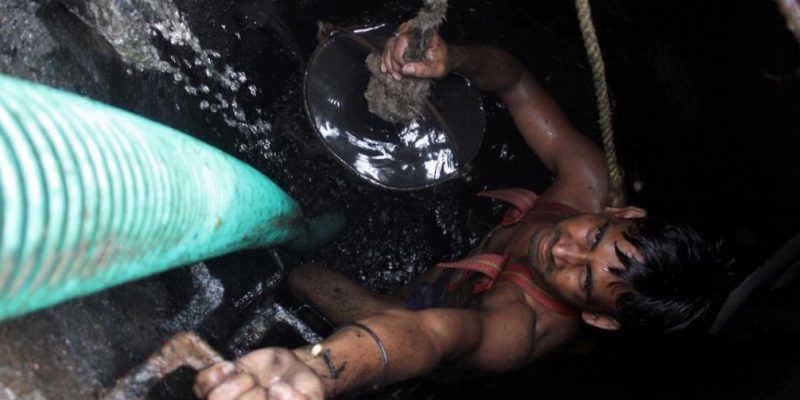Over the last few weeks, several efforts have been taken by the national and state governments to check the spread of coronavirus in India. Despite these, those who are at the forefront of these efforts, including health workers, sanitation workers, persons involved in the supply of essential commodities, etc. are at high risk. Amongst these, sanitation workers – usually poor and from specific caste groups – are one of the most vulnerable groups.
In addition to the known challenges that they face in daily lives, a positive diagnosis of the coronavirus infection could potentially add to their burdens, such as the concerns around the rapid spread of the disease within their community, and an added layer of stigma and discrimination which can lead to loss of livelihood and difficulties in availing proper health care services.
The advisory on the rational use of personal protective equipment (PPE) issued by the Ministry of Health and Family Welfare (MoHFW) puts sanitation workers at moderate risk of contracting the infection, amongst various frontline workers. Use of personal protective equipment such as gloves, masks, boots, etc. can help in minimising exposure to hazards.

The MoHFW guidelines on disinfection of common public places not only includes a list of various PPE to be used by sanitation workers involved in disinfection of public places but also suggests hand-washing technique and use of masks by these persons. The Central Pollution Control Board (CBCB) has released guidelines for handling, treatment and disposal of waste generated during treatment, diagnosis and quarantine of COVID-19 patients, which too underscores the importance of using PPE. However, various reports suggest that sanitation workers in many parts of the country have either not been provided with such PPE, or what has been provided is far from adequate.
Moreover, the scope of the guidelines by the MoHFW and CPCB is limited to certain categories of sanitation workers who are involved in various tasks in public spaces, health-care facilities, diagnostics centres, quarantine centres, and home-quarantine facilities and misses out some of the other essential categories.
For example, there could be several persons at home who have been infected but are yet to develop symptoms, or have not been tested. The waste generated from such households, such as contaminated tissues, masks etc. too could lead to a risk of infection for sanitation workers involved in domestic waste collection and segregation. Similarly, the emergency emptying of sewers or septic tanks involving human entry can be a concern in the current situation. Other categories of sanitation workers, like those involved in cleaning of drains, can be at risk as well.
Also read: Sanitation Workers Holding the Fort Against COVID-19 Have No Protective Equipment
Thus we have at hand a pressing need to undertake measures to ensure the health and safety of sanitation workers, with an equal emphasis on dignified and respectful treatment for these workers. The following are ten measures suggested for a wide range of actors in both urban and rural areas – including national and state governments; district administrations; urban local bodies, and resident welfare associations (RWAs).
1) Clarity on PPE and provision of proper PPE, soaps, sanitisers: Ensure that all sanitation workers are provided with adequate personal protective equipment which is appropriate for the nature of their work, along with soaps and hand sanitisers. All these provisions need to be replenished on a regular basis, to ensure continued usage. Since a shortage of PPE is being reported widely, the national and state governments should implement strategies to address the requirements across the country on an urgent basis. Here, it is important to note that different categories of sanitation workers have different PPE requirements subject to the nature of their work. This must be taken into account during the procurement and supply of such equipment. There is also an urgent need to build clarity on the list of PPE for sanitation workers, as the suggestions for this on the MoHFW and CPCB guidelines are different.
2) Training of workers on PPE use: Train and inform of sanitation workers about the need for PPE and how it must be used and handled; in addition to hand-washing techniques, the protocol for handling waste, and norms for physical distancing and respiratory hygiene and cough etiquette must also be conveyed. Such sessions should focus on convincing them to use these PPE.
3) Orientation on COVID-19 prevention: Conduct orientations for sanitation workers and their families on important aspects such as the means by which coronavirus is spread; the symptoms of COVID-19; specific precautions to be taken considering their work environment and living conditions; when, how and whom to seek help from; etc.
4) Adequate hand washing facilities at the place of work: Provide adequate hand washing facilities with regular supply of water, soap and sanitisers at the site of work. In case the worksite does not have these, temporary mechanisms such as foot-operated hand washing systems may be installed. Depending upon the nature of work, bathing facilities close to the place of work may also be required.
5) Proper waste management and a ban on sewer/septic tank entry to reduce exposure: Designate officials for regular inspection with proper documentation, to ensure that protocols for waste segregation, containment and handling are being followed at hospitals, diagnostic labs, quarantine centres, and home-quarantine facilities, as prescribed under the CPCB guidelines on COVID-19, in order to reduce exposure of sanitation workers to hazardous waste. Also, strict measures must be undertaken to necessarily avoid any human entry in sewers and septic tanks, during the pandemic.
6) Regular health check-ups: Ensure regular health check-up of sanitation workers for symptoms of COVID-19, at least once every three days.
7) Financial and material support: Ensure that an assured pay or a lumpsum compensation including groceries and other essential supplies are provided to sanitation workers who have been quarantined with symptoms or diagnosed with COVID-19, and are thus unable to work.
8) Insurance coverage: Expand the coverage of the insurance scheme for health care workers to sanitation workers as well. Here, the coverage of all sanitation workers must be ensured, irrespective of the type of work, or nature of their employment such regular, contractual or informal. Moreover, coverage under medical insurance schemes such as Pradhan Mantri Jan Arogya Yojana (PMJAY) must be ensured for all sanitation workers and their families not covered already.
9) Timely medical attention with dignified approach: Provide clear instructions to hospitals and diagnostics centres, to provide timely and adequate care and attention to sanitation workers, without any undignified treatment or discrimination.
10) Counselling support: Put in place systems for providing counselling and support to sanitation workers and their families, who are under quarantine or have been diagnosed with COVID-19. Such persons may also be informed about the existing helpline and support services by the government and other institutions.
India is currently at a crucial juncture in its efforts to contain and manage the pandemic. The critical role of sanitation workers, who continue to work despite the risks involved, must be recognised and appreciated. It is important that proactive efforts be taken up urgently to ensure their health and safety.
Kanika Singh is the policy officer at WaterAid India. She works on issues of sanitation and waste management, with a focus on social inclusion and sustainability.




